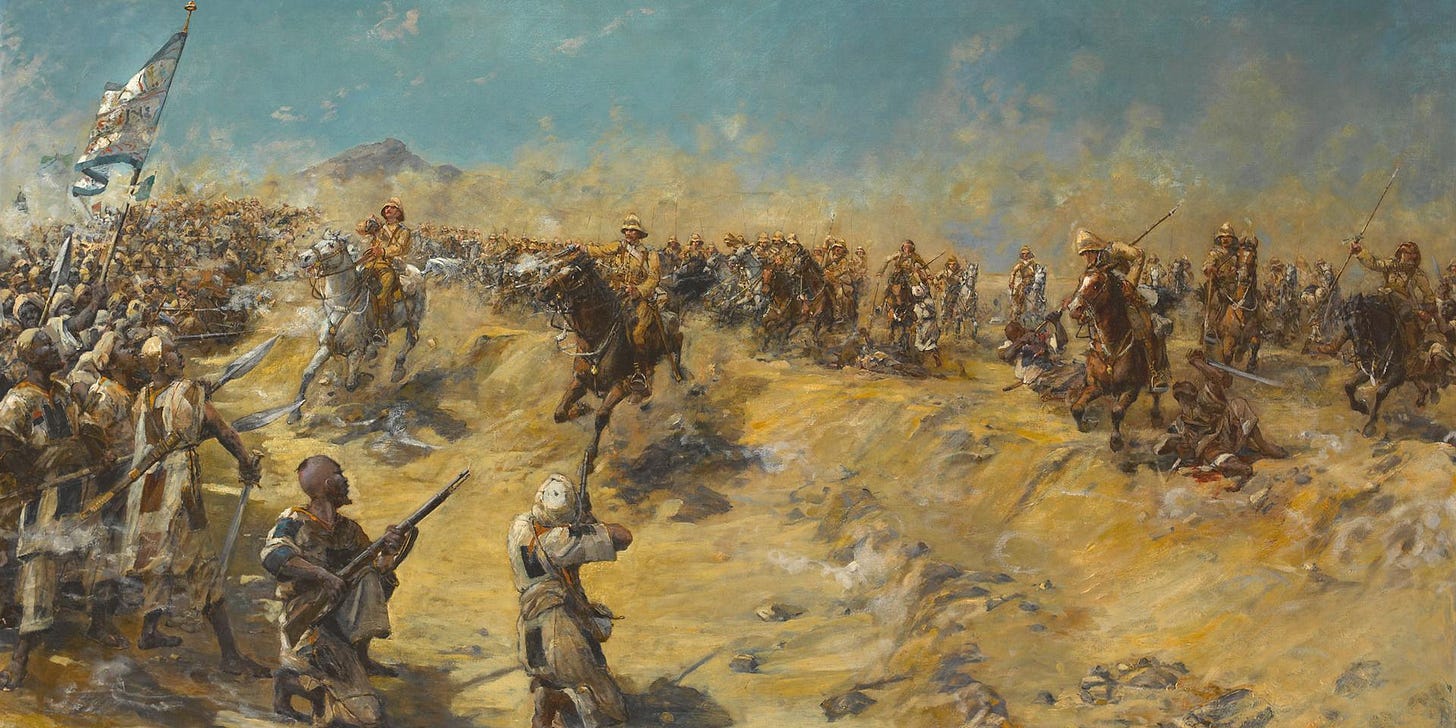Messianism as evolutionary adaptation
Mass enthusiasm is a powerful mechanism of cultural evolution
The above picture is a still from a presidential campaign ad by the Romanian Christian nationalist politician Călin Georgescu. This powerful ad features the candidate making the case for natural immunity and personal freedom by swimming in icy water (see the full ad with English subtitles). As Georgescu explains while floating in the near-freezing cold:
I trust my immune system because I have full trust and faith in its creator, God. … Immunity is nurtured and trained only in nature. Here is the reality, here is the information, not in the laboratory.
The video is emotionally compelling and, being widely shared on social media, no doubt helped catapult Georgescu to a surprise first-place win position in the first round of the Romanian presidential elections with almost 23% of the vote.
Georgescu’s ad is also unabashedly anti-science, implying vaccines are wholly ineffective (“Immunity is nurtured and trained only in nature”) and denying the validity of the scientific process itself (“Here is the reality, here is the information, not in the laboratory”).
Of course, without innumerable insights about the physical world’s (often strange and counterintuitive) properties steadily accumulated in scientific laboratories over the course of centuries, the various technologies Georgescu uses to record messages and communicate with the public would not exist.
Georgescu has a surprising background for a religious nationalist, having served in high-level sustainable development bodies such as as the UN Global Sustainable Index Institute in Geneva and the Club of Rome. He seems to combine the radical skepticism towards science of both the New-Age left and the religious right.
Georgescu’s success is no accident however. His rhetoric and that of his followers is heavily laden with religious themes: appeals to God and the sanctity of natural life, a fatalistic submission to accept divinely ordained fate, an iron determination to embody God’s will, and a sense of his assent as a miracle. Above all, Georgescu’s followers are seized by enthusiasm at the idea of a moral purification and salvation of Romania.
If I have gone into some detail on Georgescu’s appeal, it is because it seems typical of that of messianic movements general. Across the world, religious movements have regularly appeared by which a charismatic figure leads their followers in the name of coming salvation. Indeed, messianism is encoded in many religions’ DNA whenever these promise future redemption through a messianic figure, including Judaism (which coined the term Messiah), Christianity (the Christ of the Second Coming), Islam (the future Mahdi), and Buddhism (the future Buddha Maitreya).
Taking their cue from militant atheists like Richard Dawkins, Darwinism is often associated in popular discourse with purely anti-religious argument. I will take a different tack inspired by evolutionary biologist David Sloan Wilson: evolutionary thinking can help us understand why religion is so often compelling and what its evolutionary impact is.
At bottom, every religion forms a moral community within which all members adhere to certain values, symbols, and practices. Religions powerfully influence members’ behavior, representing in this sense a kind of sociocultural programming. Because religions can have radically different precepts on who should be members and what these members should do, they represent a remarkable example of cultural evolution, enabling far faster group change through culture than would be possible through genetic evolution alone.
As mentioned, members of moral communities nominally adhere to the same symbols and values even as they cannot agree on what these mean. For millennia, Christians have argued over what is the meaning of the “true Christian religion.” A third of the population of Germany and much of the populations of England and France died during the Reformation precisely over such debates and civil wars about real Christianity.
It is easy for non-Christians to scoff at this but it seems every lasting religious and political community is bound by nominal adherence to shared ethereal values. For example, all U.S. politicians pledge allegiance to the Constitution. As Kamala Harris said in her concession speech: “In our nation, we owe loyalty not to a president or a party, but to the Constitution of the United States.” In the age of Trump especially, the Constitution is seen to embody what the president cannot do and frame the means of legitimate opposition. But scarcely anyone, least of all politicians and legal scholars, actually agree on what the Constitution “really” means.

Similarly in the European Union, mainstream leaders and the EU institutions judge politicians’ respectability by adherence to “European values.” But what just what are these values? The “European values” of Konrad Adenauer and Charles de Gaulle were certainly not the same as those embodied by Angela Merkel and Emmanuel Macron. In every moral community, the symbols and values that are the nominal object of fealty are in fact a moving target whose meaning changes over time, sometimes radically so.
I suggest that messianism can be seen as a cultural evolutionary adaptation grounded in human beings’ religious impulse. I will argue that successful messianic movements can be adaptive both for the followers and, insofar as such movements prompt cultural change, for societies as a whole.
What is a messianic movement concretely? Typically a charismatic leader attracts followers. The followers tend to be alienated, in search of values (a response to anomie, or disturbance at the breakdown, change, and/or absence of values), and often, but certainly not always, made up of more disenfranchised elements of society.
The followers, previously disorganized individuals, coalesce around the leader and his professed values. The societal triumph of the movement becomes synonymous with the promise of redemption through spiritual purification. Concretely, the messianic movement will establish new autonomous communities (e.g., the Pilgrim Fathers or Mormons creating new settlements) or even take over the society (e.g., the rise of Christianity).

In triumphing, a messianic movement thus creates or transforms societies. This is eminently adaptive for the followers: these go from being marginals or subalterns to members of the new dominant or independent religious community. Jewish and Christian scripture is absolutely full of passages about the coming triumph of the downtrodden community. The Israelite prophets’ pronouncements were often about the very concrete promise of (re)claiming the Promised Land and violently evicting both rival tribes and occupying powers. In the New Testament, Jesus proclaims that “many who are first will be last, and many who are last will be first” (Matthew 19:30).
There is also reason to believe Buddhism arose as a reaction to ancient proto-Hinduism’s domination by the hereditary priestly brahmin class. Gautama Buddha’s sutras often redefine proto-Hindu concepts to discredit the brahmins’ monopoly of spiritual power and participation in the new Buddhist spiritual elite, the community of monks (sangha), was not hereditary.
Successful messianism is also evolutionarily relevant at the group level: the society’s identity and behavior are to some extent changed by the institutions, practices, and values of the new movement. This represents a powerful source of cultural evolutionary change. To consider just how powerful, look at how the Jesus movement (chiefly Saint Paul, it would seem) created, from the small, ethnically exclusive Hebrew religion, a missionary universal religion which is now the most populous in the world.
I would argue that Christianity’s successful spread relative to Judaism was no accident but enabled by messianic innovations. In early Christianity, living the faith and martyrdom (spectacularly dying for the faith) were upheld as the highest ideals, even above one’s own family and biological descendants. Saint Paul in particular enabled the spread of Christianity by preaching to non-Jews and not requiring circumcision for non-Jewish converts.
Christianity has continued to “evolve” over the centuries, with charismatic leaders like Martin Luther, John Calvin, and John Winthrop founding new movements which have often proven more dynamic and compelling than more conservative forms of Christianity. Consider that specifically Protestant forms of Christianity are spreading in historically Catholic and Orthodox countries: over 6% of Romanians and an astonishing 31% of Brazilians are now Protestants. Evidently, charismatic leaders and their followers can reform or found religions in ways that make them more evolutionarily successful.
Of course, Judaism itself represented an innovation relative to previous Middle Eastern religions. Certainly, the ancient Middle East had many state religions and sacred texts. However, by creating a religion based on a common body of scripture (the Hebrew Bible or Old Testament), a specialized priestly class, monolatry (worship of the Hebrew God alone), and a rigorous code of conduct prescribing in-group marriage, child-rearing, and solidarity with fellow Jews, the founders of Judaism created a religion that could survive the fall of the Hebrew kingdoms. This has enabled Jews to survive, despite being scattered, as a distinct people for thousands of years up the present day. The same cannot be said for the vast majority of ancient peoples—Gaulish, Mesopotamians, Romans…—have since dissolved into other nations.
This isn’t to say that all messianic movements are successful or good.
To the contrary, history is full of forgotten would-be messiahs. Some of them had astonishing impact in their day. In the 1880s and 90s, the British and Egyptians fought a major war against a Sudanese leader who founded an Islamic state and claimed to be the Mahdi (the war was reported on by a young Winston Churchill). The Taiping Rebellion is the most murderous civil war you’ve never heard of, whereby a Chinese leader claiming to be the brother of Jesus Christ rebelled against the Empire of China. The rebellion, which lasted 14 years, was eventually squashed, but an estimated 20 to 30 million people died in the process.
Even when a messianic movement is successful, that doesn’t mean its impact will necessarily be positive. Rather, it only implies a changeover of power and a certain amount of religious and therefore sociocultural change. In nature, most genetic mutations are in fact neutral or harmful in effect. It may well be the same with religious revolutions.
Occasionally however, religious revolution may lead to new, uniquely adaptive cultural practices, better enabling the survival and spread of the group. Certainly, species and cultures that are capable of occasional change, even if that change is often harmful, will in the long run outcompete societies that purely static.
The religions that actually survive to the present day are precisely those more likely to have such adaptive features than various dead religions. Consider Greco-Roman paganism. This diverse family of local cults was tolerant of different religious practices. Greco-Roman paganism lacked centralization, uniformity of scripture or practice, or a dedicated priestly class separate from the state. No surprise then that local pagan cults eventually died out when the states these were integrated with fell or when they were subject to distinctly less tolerant Christian or Muslim regimes.
The dynamics of religious messianism are relevant not only to our religious past and to contemporary religious movements. The phenomenon of religious messianism can also be compared to political messianism in the form of revolutionary ideologies and movements.
As moral value systems that police behavior within a community, religions and political ideologies share a lot in common. Each features adherence to particular symbols, stated values, customs, and the policing of taboos. Members of these communities fiercely fight over who should be excommunicated for not respecting the values of the community.
Scholars have long written about the American civil religion that characterizes political life in the United States—featuring invocations of God, solemn political rituals, allegiance to and invocation of sacred texts such as the Declaration of Independence, the Constitution, and the Gettysburg Address, and foundational assumptions about the sacred value of freedom, equal rights, and democracy. Many scholars have also written about the religious-like features of totalitarian states with their cults of personality, Talibanesque efforts to wipe away the past, and mass fanaticism in the service of a promised earthly paradise. Even Holocaust remembrance has been compared to a civil religion and zealous youth movements attacking climate change have often been compared to a “crusade.”

As with many messianic movements, the effects of most political revolutions, and certainly the most “innovative” and ambitious ones, would seem to be bad. The more ambitious revolutions—as in the of the French, Bolshevik, Nazi, and Maoist revolutions—often have the most disastrous the results. As in nature, most mutations are neutral or bad. Political messianism tends to have negative effects because it is too passionate. The passions, emotional incontinence, blind us to our real considered interests.
At the more benign end and at their most simplistic, revolutions replace the leadership of one insecure, power-grasping band of humans with an equally or more vicious insecure, power-grasping band of humans. The revolutionaries’ followers are often disappointed to learn their side, which enthusiastically fought for power by claiming to have morally superior leaders than the old regime, turn out to be just as imperfect or worse.
Occasionally however, a revolution can be remarkably successful as the new regime consolidates and its power and values then spread across the world. This will be the case when the new practices are actually adaptive in some sense, meaning the society becomes more resilient, powerful, and attractive overall. This is achieved not by the purportedly “morally better” side winning, but by affirming values and creating institutions actually conducive to better government and human flourishing.
It would seem that periodic religious and political enthusiasm are as ineradicable as the human condition. I would argue these reflect genuine and widespread human aspirations for meaning and community. The question is whether these aspirations can be met and channeled in ways actually conducive to human happiness. There can be no positive change without experimentation but, at least, we should try to experiment intelligently.





The Cultural Revolution is the only popular uprising of the 1960s that achieved its goals: teach 400,000,000 peasants to read, write, vote and care for their health–inside 10 years.